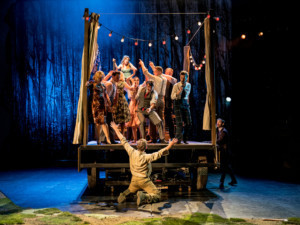Review: PETER GYNT, National Theatre

![]() On Top of the Pops, when Whitney warbled, "Learning to love yourself / It is the greatest love of all", it felt wrong to me. Three decades on, it feels worse - but I'm in the minority. Selfies, Instagram, reality TV all have reified the self as a subject - endlessly looking inwards at a gap, an absence, a lack that needs filling.
On Top of the Pops, when Whitney warbled, "Learning to love yourself / It is the greatest love of all", it felt wrong to me. Three decades on, it feels worse - but I'm in the minority. Selfies, Instagram, reality TV all have reified the self as a subject - endlessly looking inwards at a gap, an absence, a lack that needs filling.
Advertisers will tell you how, natch, but it's all so normalised now that empathy seems to be draining away, the imaginative leap required to see the world through the eyes of another just too demanding to attempt - too risky too. How much room is left for others if one is continually monitoring one's adherence to the maxim, "To thyself be true?".
David Hare has taken Henrik Ibsen's Peer Gynt and set it in the present - Peer now Peter and a Scotsman, keen to make his way in a world that he conjures into reality. His mother sees through him, of course, but that just sends him off on adventures that have eerie parallels with figures in today's world.
He meets trolls (Scandinavian folklore trolls) who give him a lesson in ruthlessness, makes so much money that he can cheat on his own golf course (who would do such a thing?), and loses it all because he can't judge the shysters with whom he's dealing.
Eventually his turn comes, but, even after so extraordinary a life, he's neither sinful enough for hell nor virtuous enough for heaven, and his fate is to be melted down and forged into another person for another go at life - not something Peter fancies at all.
If that all sounds a little deep and demanding, well, sometimes it is (at well over three hours with two intervals, there's time for most things), but the intellectual fare is leavened with that most attractive of unpleasant traits, chutzpah.
We get plenty of that from director, Jonathan Kent, who isn't afraid to dip into the Dennis Potter songbook for musical theatre dream sequences and uses Dick Straker's video to great effect as Peter sails back to Scotland.
But Peter himself is a king of chutzpah, James McArdle a compelling presence - sometimes a fool, sometimes a tyrant, but never less than charismatic. You see why Peter led the life he led and why that same narcissistic personality disorder that drove his success in creating the worlds he imagined (himself at their centres, of course), sowed the seeds of his downfalls. He bounces between triumphs of the will and hubristic comeuppance.
McArdle holds it together - never has a play's title been more earned - but he gets excellent support from Ann Louise Ross as his mother and Guy Henry as a devilish harbinger of death. Tamsin Carroll is splendid both as the seductive daughter of the Troll King and as Anitra, who sets Peter up as a guru and then cleans him out in a nice reversal of the usual cult dynamic.
It's self-indulgently long of course - though perhaps forgivably so, seeing as self-indulgence is a key theme of the play - and the end is an awfully long time coming, but you should know that when you book I suppose. The politics is a little heavy-handed at times, a mention of the Iraq War feeling both unnecessary and a generation too late.
The London audience might (still) look kindly on David Hare's announcements on The State Of The Nation, but whether a Scottish setting and lots of Scottish accents will be enough to woo those North of the border remains to be seen (the show goes to Edinburgh International Festival in August). Scots don't seem to have much patience with the pronouncements of privately educated Englishmen at the moment...
Peter Gynt is at the National Theatre until 8 October.
Photo Manuel Harlan
Videos
